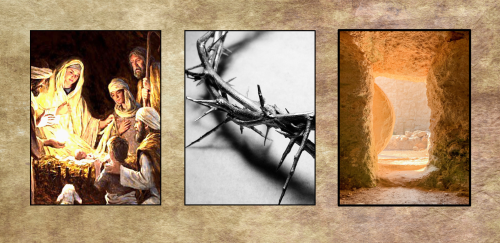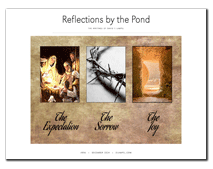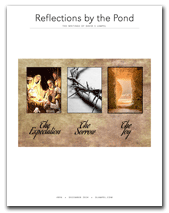But when the fullness of the time came,
God sent forth His Son, born of a woman, born under the Law,
so that He might redeem those who were under the Law,
that we might receive the adoption as sons. Galatians 4:4–5
The Expectation
Right about now, churches the world over are in final preparations for their Christmas programs. The choir members are putting the final polish on the songs, the actors are adding last-minute nuances to their characters, and the director is tearing out his hair over irritating details that people keep bringing to his attention. From simple narrated cantatas to spectacular, surround-sound extravaganzas, music and drama departments of every stripe are readying their presentation of adoration.
And the body of Christ stands in the wings, waiting for its cue.
Within the many flavors and sects of the Christian faith, there are variations on the way they celebrate Christmas. But the essential component remains: the expectation of His birth, and the subsequent adoration of the Christ child. No matter the color of our skin, or the traditions into which we have been born, Christmas means the incarnation of our salvation. No matter our denomination—evangelical, charismatic, high church, low church, reformed, Protestant or Catholic, premillennial or postmillennial—we all come together to proclaim that in Christ, God has come down to man.
Thus about this same time every year, we all feel the rush of expectation that soars in our spirit as we contemplate the Child, and the circumstances of His miraculous yet very human birth: miraculous because Jesus had no father but the Holy Spirit; human because, by all appearances, His mother gave birth in a perfectly normal way.
But those in attendance knew that this was no normal birth. From the shepherds to the tardy magi, to Mary with her espoused—without knowing all the details, they all knew that life on earth had forever changed.
In their arms and in their gaze lay salvation from sin and death, freedom from the oppressive law, and the traditions of a religious system run amok. In that filthy manger, in a poor and conquered land, lay the hope for all mankind—both Jew and Gentile. In that manger lay God Himself.
For in Him all the fullness of God was pleased to dwell, And through Him to reconcile all things to Himself, having made peace through the blood of His cross—through Him—whether things on earth or things in heaven.
Colossians 1:19–20
For the life of the flesh is in the blood, and I have given it to you on the altar to make atonement for your souls; for it is the blood that makes atonement by the life.
Leviticus 17:11
The Sorrow
Just as we cannot consider Bethlehem without contemplating the cross that would follow, so we cannot look upon a God who would graciously give us His only Son without considering the pain He experienced in the giving.
At least as long ago as the beginning of man’s existence on earth, God ordained that communion with Him would come only by atonement: man was too far from God’s holiness and purity to approach Him without a covering—without a pardon for his impurities. God also ordained, early on, that this atonement would require blood. Man could not commune with God without paying the price of shed blood.
Thus when mankind reached a certain age, God set into motion the plan that would, once and for all, make ultimate atonement for all mankind: the sacrifice of His own Son. Any other sacrifice would fall short; only the death of God Himself would sufficiently cover over the sins of the entire world. But for this blood to be shed, God must first become flesh, for only as flesh could He die.
And so we come to that moment nine months prior to Bethlehem—that singular, shattering moment in which the Spirit of God joined with flesh to create a unique individual: the God/Man called Jesus. It was, indeed, a moment of joy for man and, in a way, a moment of joy for God, for this was the beginning of His plan to pave the way for His creation to commune with Him.
“My Father, who has given them to Me, is greater than all; and no one is able to snatch them out of the Father’s hand. I and the Father are one.”
John 10:29–30
But it was also a moment permeated with sorrow, for God the Father knew what that baby would ultimately suffer—which meant that He would suffer as well. For as Jesus would later explain, He and the Father are one. In ways mere mortals will never comprehend, the Son and the Father are one.
And the Child that would rest in that Bethlehem feeding trough would grow into a man who would take upon Himself the weight of every sin committed, the sorrow of every broken heart, the pain of every pierced side. As the baby took His first breath, the Father and Spirit were at once there, in the stable, and beneath a hard wooden cross bearing the blood of the sacrificed Son.
The Joy
“All that the Father gives Me will come to Me, and the one who comes to Me I will never cast out. For I have come down from heaven, not to do My own will, but the will of Him who sent Me. Now this is the will of Him who sent Me, that of all that He has given Me I lose nothing, but raise it up on the last day. For this is the will of My Father, that everyone who sees the Son and believes in Him will have eternal life, and I Myself will raise him up on the last day.”
John 6:37–40
There He was: God in the person of a newborn child, wrapped in uncomfortable flesh and breathing in the earthy scent of a humble beginning. And beating in the child’s breast was a heart bigger than time itself, for before time began He had set out to draw man to Himself.
In that moment of incarnation in a Bethlehem stable was the joy-filled beginning of a wondrous new relationship between God and man. As a newborn forever changes the lives of his or her parents, the newborn Christ Child forever changed how God considered man, and how man would look to God.
No more would there be the dizzying layers of minute regulations, intricate gateways to trap man in his own inconsistencies. No more would there be intermediaries to represent common, unschooled man before a righteous God. No more would there be restricted inner sanctums where soiled and sinful man was locked out, kept from the presence of holy God.
As an awestruck parent looks down upon her new child, imagining the soon and coming days of wonder and delight, so God the Father looked down from heaven, filled with the joy of what was to come in His new relationship with creation. Just as the obstructing veil would be coming down for small man, so too would God Himself now have new access to those He would call His own.
And because God lives outside of time, dwelling at once in the beginning, the end, and every milestone in between, at the moment of His birth in a village of Judea, He was already living out the exquisite joy of having drawn man to Himself through the person—the birth, the life, the death, the resurrection—of Jesus, the Christ.
…fixing our eyes on Jesus, the author and perfecter of faith, who for the joy set before Him endured the cross, despising the shame, and has sat down at the right hand of the throne of God. For consider Him who has endured such hostility by sinners against Himself, so that you will not grow weary, fainting in heart.
Hebrews 12:2–3
Issue #896 December 2024
Reflections by the Pond is published monthly at dlampel.com and is © 2024 David S. Lampel. Unless otherwise indicated, all Scripture quotations taken from the (LSB®) Legacy Standard Bible®, Copyright © 2021 by The Lockman Foundation. Used by permission. All rights reserved. Managed in partnership with Three Sixteen Publishing Inc. LSBible.org and 316publishing.com. Cover photo of Tomb by Pisit Heng on Unsplash. This and all of our resources are offered free-of-charge to the glory and praise of Christ our Lord.



